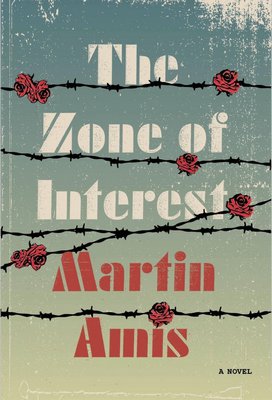
Martin Amis has never been one to shy away from uncomfortable subjects, particularly about the totalitarian horrors of the 20th and 21st centuries. He’s written about Soviet camps in “Koba the Dread” and “House of Meetings.” He’s imagined himself into the mind of a terrorist in “The Second Plane.” And he’s written about Auschwitz in both his memoir, “Experience,” and his technically dazzling novel “Time’s Arrow,” in which he envisions time running backward, following the life of a Nazi doctor from his death to his birth.Mr. Amis, who is a frequent visitor to the East End, examines Auschwitz once again in his latest novel, “The Zone of Interest” (Knopf, 306 pp., $26.95). Dark humor is Mr. Amis’s specialty and, in “The Zone of Interest,” it is very dark indeed. It is a love story set in the most grisly of contexts.
The tale has three narrators, alternating throughout the course of the novel. There is Angelus “Golo” Thomsen, who is a mid-level manager at the I.G. Farben plant at Auschwitz, which is working to produce artificial rubber and fuel for the German war effort. Next is the camp commandant, Paul Doll, who is completely indifferent to the suffering he’s causing. And finally there is Sonderkommando-Führer Szmul, the head of the Jews who prolong their own lives by assisting the Nazi killing machine—and, when done, comb over the dead bodies looking for valuables. They are described in the camp as “the crows of the charnel house.”
Thomsen, on first seeing Hannah Doll—the commandant’s wife—is completely smitten. There are brief conversations, exchanged letters and a kiss. The affair is chaste, yet her husband is suspicious and becomes more and more unhinged. She, on the other hand, grows more and more openly appalled by him and what little she knows of the camp’s activities. At one point, she gives him two black eyes. She blatantly wishes for a Nazi defeat.
All of this plays out against the background of the camp’s hideous activities. Doll is depicted with comic genius, a man of exaggerated self-importance, a man in charge, who actually just goes with the flow with total disregard of the evil he does. He lives, thinks and speaks in clichés—“skin of my teeth,” “a lot on my plate,” to name a couple. This is particularly significant, coming from a writer famous for his abhorrence of cliché. That Mr. Amis can portray his buffoonishness without diminishing the evil of the man is a mark of his artistry.
Golo, ostensibly the novel’s protagonist, is a sort of “everyman.” He is basically decent, and seeks to obstruct the Nazi and Farben effort in small ways. Nevertheless, he went along.
The chapters narrated by Szmul are the briefest and the most tortured. He is “one of the saddest men in the history of the world,” Mr. Amis writes. He has suffered the death of his soul. He is at once sympathetic and horrifying. He doesn’t know how he can live with himself, yet he does. He clings to life even though he knows he will shortly die.
Toward the end of the novel, Golo thinks, “How did ‘a sleepy country of poets and dreamers,’ and the most highly educated nation the world has ever seen, how did it yield to such wild, to such fantastic disgrace? What made its people, men and women, consent to having their souls raped—and raped by a eunuch [i.e. Hitler] (… the virgin Priapus, the teetotal Dionysus, the vegetarian Tyrannosaurus rex)? Where did it come from, the need for such a methodical, such a pedantic, and such a literal exploration of the bestial?”
In Primo Levi’s book “The Truce”—noted in Mr. Amis’s afterword—he says that we cannot understand the Nazi hatred of the Jews. To understand it would mean that in some way we contain it; it would become a part of us. I paraphrase, we have a moral obligation to not understand.
Mr. Amis never refers to Hitler by name. He is “the Deliverer.” Among those who mocked him he is called Gröfaz, an ironic sobriquet for Größter Feldherr aller Zeiten, literally the “greatest field commander of all time.” Mr. Amis never mentions Auschwitz, only the “zone of interest,” the area around Auschwitz for a radius of 40 miles. The text is sprinkled with German words, most of which can be readily understood, yet the author never uses an umlaut in a language that is bristling with them. I’m sure this is all deliberate, but have no idea why it’s necessary.
After the war, Golo seeks Hannah, and upon finding her, asks if she would consider taking up where they left off. She refuses him, because she can’t imagine anything good coming out of the camp.
We read “The Zone of Interest” with revulsion for the Hieronymus Bosch horror that is the background of the novel, but it remains fascinating. It is a brilliant achievement.